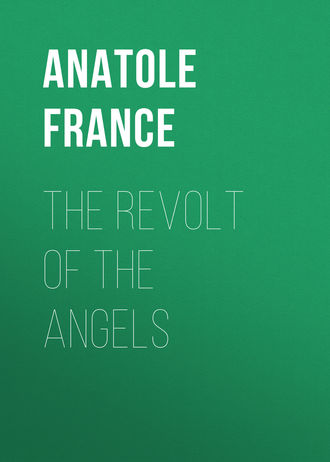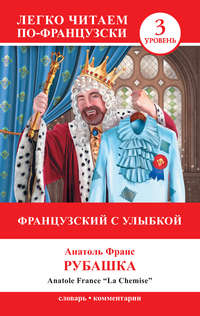 полная версия
полная версияThe Revolt of the Angels
"Exactly, that's just it," said Maurice, his eyes on the violet stripes of his flowerless pyjamas; "when one has one's guardian angel one does not even think about him, and when one has lost him one feels very lonely."
"So you miss this…"
"Well, the fact is…"
"Oh, yes, yes, you miss him. Well, my dear, the loss of such a guardian angel as that is no great matter. No, no! he is not worth much, that Arcade of yours. On that famous day, while you were out getting him some clothes, he was ever so long fastening my dress, and I certainly felt his hand… Well, at any rate, don't trust him."
Maurice dreamily lit a cigarette. They spoke of the six days' bicycle race at the winter velodrome, and of the aviation show at the motor exhibition at Brussels, without experiencing the slightest amusement. Then they tried love-making as a sort of convenient pastime, and succeeded in becoming moderately absorbed in it; but at the very moment when she might have been expected to play a part more in accordance with a mutual sentiment, she exclaimed with a sudden start:
"Good Heavens! Maurice, how stupid of you to tell me that my guardian angel can see me. You cannot imagine how uncomfortable the idea makes me."
Maurice, somewhat taken aback, recalled, a little roughly, his mistress's wandering thoughts.
She declared that her principles forbade her to think of playing a round game with angels.
Maurice was longing to see Arcade again and had no other thought. He reproached himself for suffering him to depart without discovering where he was going, and he cudgelled his brains night and day thinking how to find him again.
On the bare chance, he put a notice in the personal column of one of the big papers, running thus:
"Arcade. Come back to your Maurice."
Day after day went by, and Arcade did not return.
One morning, at seven o'clock, Maurice went to St. Sulpice to hear Abbé Patouille say Mass, then, as the priest was leaving the sacristy, he went up to him and asked to be heard for a moment.
They descended the steps of the church together and in the bright morning light walked round the fountain of the Quatre Évêques. In spite of his troubled conscience and the difficulty of presenting so extraordinary a case with any degree of credibility, Maurice related how the angel Arcade had appeared to him and had announced his unhappy resolve to separate from him and to stir up a new revolt of the spirits of glory. And young d'Esparvieu asked the worthy ecclesiastic how to find his celestial guardian again, since he could not bear his absence, and how to lead his angel back to the Christian faith. Abbé Patouille replied in a tone of affectionate sorrow that his dear child had been dreaming, that he took a morbid hallucination for reality, and that it was not permissible to believe that good angels may revolt.
"People have a notion," he added, "that they can lead a life of dissipation and disorder with impunity. They are wrong. The abuse of pleasure corrupts the intelligence and impairs the understanding. The devil takes possession of the sinner's senses, penetrating even to his soul. He has deceived you, Maurice, by a clumsy artifice."
Maurice objected that he was not in any way a victim of hallucinations, that he had not been dreaming, that he had seen his guardian angel with his eyes and heard him with his ears.
"Monsieur l'Abbé," he insisted, "a lady who happened to be with me at the time, – I need not mention her name, – also saw and heard him. And, moreover, she felt the angel's fingers straying … well, anyhow, she felt them… Believe me, Monsieur l'Abbé, nothing could be more real, more positively certain than this apparition. The angel was fair, young, very handsome. His clear skin seemed, in the shadow, as if bathed in milky light. He spoke in a pure, sweet voice."
"That, alone, my child," the Abbé interrupted quickly, "proves you were dreaming. According to all the demonologies, bad angels have a hoarse voice, which grates like a rusty lock, and even if they did contrive to give a certain look of beauty to their faces, they cannot succeed in imitating the pure voice of the good spirits. This fact, attested by numerous witnesses, is established beyond all doubt."
"But, Monsieur l'Abbé, I saw him. I saw him sit down, stark naked, in an arm-chair on a pair of black stockings. What else do you want me to tell you?"
The Abbé Patouille appeared in no way disturbed by this announcement.
"I say once more, my son," he replied, "that these unhappy illusions, these dreams of a deeply troubled soul, are to be ascribed to the deplorable state of your conscience. I believe, moreover, that I can detect the particular circumstance that has caused your unstable mind thus to come to grief. During the winter in company with Monsieur Sariette and your Uncle Gaétan, you came, in an evil frame of mind, to see the Chapel of the Holy Angels in this church, then undergoing repair. As I observed on that occasion, it is impossible to keep artists too closely to the rules of Christian art; they cannot be too strongly enjoined to respect Holy Writ and its authorized interpreters. Monsieur Eugène Delacroix did not suffer his fiery genius to be controlled by tradition. He brooked no guidance and, here, in this chapel he has painted pictures which in common parlance we call lurid, compositions of a violent, terrible nature which, far from inspiring the soul with peace, quietude, and calm, plunge it into a state of agitation. In them the angels are depicted with wrathful countenances, their features are sombre and uncouth. One might take them to be Lucifer and his companions meditating their revolt. Well, my son, it was these pictures, acting upon a mind already weakened and undermined by every kind of dissipation, that have filled it with the trouble to which it is at present a prey."
But Maurice would have none of it.
"Oh, no! Monsieur l'Abbé," he cried, "it is not Eugène Delacroix's pictures that have been troubling me. I didn't so much as look at them. I am completely indifferent to that kind of art."
"Well, then, my son, believe me: there is no truth, no reality, in any of the story you have just related to me. Your guardian angel has certainly not appeared to you."
"But, Abbé," replied Maurice, who had the most absolute confidence in the evidence of the senses, "I saw him tying up a woman's shoe-laces and putting on the trousers of a suicide."
And stamping his feet on the asphalt, Maurice called as witnesses to the truth of his words the sky, the earth, all nature, the towers of St. Sulpice, the walls of the great seminary, the Fountain of the Quatre Évêques, the public lavatory, the cabmen's shelter, the taxis and motor 'buses' shelter, the trees, the passers-by, the dogs, the sparrows, the flower-seller and her flowers.
The Abbé made haste to end the interview.
"All this is error, falsehood, and illusion, my child," said he. "You are a Christian: think as a Christian, – a Christian does not allow himself to be seduced by empty shadows. Faith protects him against the seduction of the marvellous, he leaves credulity to freethinkers. There are credulous people for you – freethinkers! There is no humbug they will not swallow. But the Christian carries a weapon which dissipates diabolical illusions, – the sign of the Cross. Reassure yourself, Maurice, – you have not lost your guardian angel. He still watches over you. It lies with you not to make this task too difficult nor too painful for him. Good-bye, Maurice. The weather is going to change, for I feel a burning in my big toe."
And Abbé Patouille went off with his breviary under his arm, hobbling along with a dignity that seemed to foretell a mitre.
That very day, Arcade and Zita were leaning over the parapet of La Butte, gazing down on the mist and smoke that lay floating over the vast city.
"Is it possible," said Arcade, "for the mind to conceive all the pain and suffering that lie pent within a great city? It is my belief that if a man succeeded in realising it, the weight of it would crush him to the earth."
"And yet," answered Zita, "every living being in that place of torment is enamoured of life. It is a great enigma!
"Unhappy, ill-fated, while they live, the idea of ceasing to be is, nevertheless, a horror to them. They look not for solace in annihilation, it does not even bring them the promise of rest. In their madness they even look upon nothingness with terror: they have peopled it with phantoms. Look you at these pediments, these towers and domes and spires that pierce the mist and rear on high their glittering crosses. Men bow in adoration before the demiurge who has given them a life that is worse than death, and a death that is worse than life."
Zita was for a long time lost in thought. At length she broke silence, saying:
"There is something, Arcade, that I must confess to you. It was no desire for a purer justice or wiser laws that hurried Ithuriel earthward. Ambition, a taste for intrigue, the love of wealth and honour, all these things made Heaven, with its calm, unbearable to me, and I longed to mingle with the restless race of men. I came, and by an art unknown to nearly all the angels, I learned how to fashion myself a body which, since I could change it as the fancy seized me, to whatsoever age and sex I would, has permitted me to experience the most diverse and amazing of human destinies. A hundred times I took a position of renown among the leaders of the day, the lords of wealth and princes of nations. I will not reveal to you, Arcade, the famous names I bore; know only that I was pre-eminent in learning, in the fine arts, in power, wealth, and beauty, among all the nations of the world. At last, it was but a few years since, as I was journeying in France, under the outward semblance of a distinguished foreigner, I chanced to be roaming at evening through the forest of Montmorency, when I heard a flute unfolding all the sorrows of Heaven. The purity and sadness of its notes rent my very soul. Never before had I hearkened to aught so lovely. My eyes were wet with tears, my bosom full of sobs, as I drew near and beheld, on the skirts of a glade, an old man like to a faun, blowing on a rustic pipe. It was Nectaire. I cast myself at his feet, imprinted kisses on his hands and on his lips divine, and fled away…
"From that day forth, conscious of the littleness of human achievements, weary of the tumult and the vanity of earthly things, ashamed of my vast and profitless endeavours, and deciding to seek out a loftier aim for my ambition, I looked upwards towards my skiey home and vowed I would return to it as a Deliverer. I rid myself of titles, name, wealth, friends, the horde of sycophants and flatterers and, as Zita the obscure, set to work in indigence and solitude, to bring freedom into Heaven."
"And I," said Arcade, "I too have heard the flute of Nectaire. But who is this old gardener who can thus woo from a rude wooden pipe notes that are so moving and so beautiful?"
"You will soon know," answered Zita.
CHAPTER XVI
WHEREIN MIRA THE SEERESS, ZÉPHYRINE, AND THE FATAL AMÉDÉE ARE SUCCESSIVELY BROUGHT UPON THE SCENE, AND WHEREIN THE NOTION OF EURIPIDES THAT THOSE WHOM ZEUS WISHES TO CRUSH HE FIRST MAKES MAD, IS ILLUSTRATED BY THE TERRIBLE EXAMPLE OF MONSIEUR SARIETTE
DISAPPOINTED at his failure to enlighten an ecclesiastic renowned for his clarity of mind, and frustrated in the hope of finding his angel again on the high road of orthodoxy, Maurice took it into his head to resort to occultism and resolved to go and consult a seer. He would have undoubtedly applied to Madame de Thèbes, but he had already questioned her on the occasion of his early love troubles, and her replies showed such wisdom that he no longer believed her to be a soothsayer. He therefore had recourse to a fashionable medium, Madame Mira. He had heard many examples quoted of the extraordinary insight of this seeress, but it was necessary to present Madame Mira with some object which the absent one had either touched or worn and to which her translucent gaze had to be attracted. Maurice, trying to remember what the angel had touched since his ill-fated incarnation, recollected that in his celestial nudity he had sat down in an arm-chair on Madame des Aubels' black stockings and that he had afterwards helped that lady to dress.
Maurice asked Gilberte for one of the talismans required by the clairvoyante. But Gilberte could not give him a single one, unless, as she said, she herself were to play the part of the talisman. For the angel had, in her case, displayed the greatest indiscretion, and such agility that it was impossible always to forestall his enterprise. On hearing this confession, which nevertheless told him nothing new, Maurice lost his temper with the angel, calling him by the names of the lowest animals and swearing he would give him a good kick when he got him within reach of his foot. But his fury soon turned against Madame des Aubels; he accused her of having provoked the insolence she now denounced, and in his wrath he referred to her by all the zoological symbols of immodesty and perversity. His love for Arcade was rekindled in his heart, and burned with a more ardent flame than ever, and the deserted youth, with outstretched arms and bended knees, invoked his angel with sobs and lamentations.
During his sleepless nights it occurred to him that perhaps the books the angel had turned over before his incarnation might serve as a talisman. One morning, therefore, Maurice went up to the library and greeted Monsieur Sariette, who was cataloguing under the romantic gaze of Alexandre d'Esparvieu. Monsieur Sariette smiled, but his face was deathly pale. Now that an invisible hand no longer upset the books placed under his charge, now that tranquillity and order once more reigned in the library, Monsieur Sariette was happy, but his strength diminished day by day. There was little left of him but a frail and contented shadow.
"One dies, in full content, of sorrow past."
"Monsieur Sariette," said Maurice, "you remember that time when your books were disarranged every night, how armfuls disappeared, how they were dragged about, turned over, ruined, and sent rolling helter-skelter as far as the gutter in the Rue Palatine. Those were great days! Point out to me, Monsieur Sariette, the books which suffered most."
This proposition threw Monsieur Sariette into a melancholy stupor, and Maurice had to repeat his request three times before he could make the aged librarian understand. At length he pointed to a very ancient Talmud from Jerusalem as having been frequently touched by those unseen hands. An apocryphal Gospel of the third century, consisting of twenty papyrus sheets, had also quitted its place time after time. Gassendi's Correspondence too seemed to have been well thumbed.
"But," added Monsieur Sariette, "the book to which the mysterious visitant devoted the most particular attention was undoubtedly a little copy of Lucretius adorned with the arms of Philippe de Vendôme, Grand Prieur de France, with autograph annotations by Voltaire, who, as is well known, frequently visited the Temple in his younger days. The fearsome reader who caused me such terrible anxiety never grew weary of this Lucretius and made it his bedside book, as it were. His taste was sound, for it's a gem of a thing. Alas! the monster made a blot of ink on page 137 which perhaps the chemists with all the science at their disposal will be powerless to erase."
And Monsieur Sariette heaved a profound sigh. He repented having said all this when young d'Esparvieu asked him for the loan of the precious Lucretius. Vainly did the jealous custodian affirm that the book was being repaired at the binder's and was not available. Maurice made it clear that he wasn't to be taken in like that. He strode resolutely into the abode of the philosophers and the globes and seating himself in an arm-chair said:
"I am waiting."
Monsieur Sariette suggested his having another edition. There were some that, textually, were more correct, and were, therefore, preferable from the student's point of view. He offered him Barbou's edition, or Coustelier's, or, better still, a French translation. He could have the Baron des Coutures' version – which was perhaps a little old-fashioned – or La Grange's, or those in the Nisard and Panckouke series; or, again, there were two versions of striking elegance, one in verse and the other in prose, both from the pen of Monsieur de Pongerville of the French Academy.
"I don't need a translation," said Maurice proudly. "Give me the Prior de Vendôme's copy."
Monsieur Sariette went slowly up to the cupboard in which the jewel in question was contained. The keys were rattling in his trembling hand. He raised them to the lock and withdrew them again immediately and suggested that Maurice should have the common Lucretius published by Garnier.
"It's very handy," said he with an engaging smile.
But the silence with which this proposal was received made it clear that resistance was useless. He slowly drew forth the volume from its place, and having taken the precaution to see that there wasn't a speck of dust on the table-cloth, he laid it tremblingly thereon before the great-grandson of Alexandre d'Esparvieu.
Maurice began to turn the leaves, and when he got to page 137 he saw the stain which had been made with violet ink. It was about the size of a pea.
"Ay, that's it," said old Sariette, who had his eye on the Lucretius the whole time; "that's the trace those invisible monsters left behind them."
"What, there were several of them, Monsieur Sariette?" exclaimed Maurice.
"I cannot tell. But I don't know whether I have a right to have this blot removed since, like the blot Paul Louis Courier made on the Florentine manuscript, it constitutes a literary document, so to speak."
Scarcely were the words out of the old fellow's mouth when the front door bell rang and there was a confused noise of voices and footsteps in the next room. Sariette ran forward at the sound and collided with Père Guinardon's mistress, old Zéphyrine, who, with her tousled hair sticking up like a nest of vipers, her face aflame, her bosom heaving, her abdominal part like an eiderdown quilt puffed out by a terrific gale, was choking with grief and rage. And amid sobs and sighs and groans and all the innumerable sounds which, on earth, make up the mighty uproar to which the emotions of living beings and the tumult of nature give rise, she cried:
"He's gone, the monster! He's gone off with her. He's cleared out the whole shanty and left me to shift for myself with eighteenpence in my purse."
And she proceeded to give a long and incoherent account of how Michel Guinardon had abandoned her and gone to live with Octavie, the bread-woman's daughter, and she let loose a torrent of abuse against the traitor.
"A man whom I've kept going with my own money for fifty years and more. For I've had plenty of the needful and known plenty of the upper ten and all. I dragged him out of the gutter and now this is what I get for it. He's a bright beauty, that friend of yours. The lazy scoundrel. Why, he had to be dressed like a child, the drunken contemptible brute. You don't know him yet, Monsieur Sariette. He's a forger. He turns out Giottos, Giottos, I tell you, and Fra Angelicos and Grecos, as hard as he can and sells them to art-dealers – yes, and Fragonards too, and Baudouins. He's a debauchee, and doesn't believe in God! That's the worst of the lot, Monsieur Sariette, for without the fear of God…"
Long did Zéphyrine continue to pour forth vituperations. When at last her breath failed her, Monsieur Sariette availed himself of the opportunity to exhort her to be calm and bring herself to look on the bright side of things. Guinardon would come back. A man doesn't forget anyone he's lived and got on well with for fifty years —
These two observations only goaded her to a fresh outburst, and Zéphyrine swore she would never forget the slight that had been put on her; she swore she would never have the monster back with her any more. And if he came to ask her to forgive him on his knees, she would let him grovel at her feet.
"Don't you understand, Monsieur Sariette, that I despise and hate him, that he makes me sick?"
Sixty times she voiced these lofty sentiments; sixty times she vowed she would never have Guinardon back with her again, that she couldn't bear the sight of him, even in a picture.
Monsieur Sariette made no attempt to oppose a resolve which, after protestations such as these, he regarded as unshakable. He did not blame Zéphyrine in the least. He even supported her. Unfolding to the deserted one a purer future, he told her of the frailty of human sentiment, exhorted her to display a spirit of renunciation and enjoined her to show a pious resignation to the will of God.
"Seeing, in truth, that your friend is so little worthy of affection …"
He was not suffered to continue. Zéphyrine flew at him, and shaking him furiously by the collar of his frock-coat, she yelled, half choking with rage: "So little worthy of affection! Michel! Ah! my boy, you find another more kind, more gay, more witty, you find another like him, always young, yes, always. Not worthy of affection! Anyone can see you don't know anything about love, you old duffer."
Taking advantage of the fact that Père Sariette was thus deeply engaged, young d'Esparvieu slipped the little Lucretius into his pocket, and strolled deliberately past the crouching librarian, bidding him adieu with a little wave of the hand.
Armed with his talisman, he hastened to the Place des Ternes, to interview Madame Mira. She received him in a red drawing-room where neither owl nor frog nor any of the paraphernalia of ancient magic were to be found. Madame Mira, in a prune-coloured dress, her hair powdered, though already past her prime, was of very good appearance. She spoke with a certain elegance and prided herself on discovering hidden things by the help alone of Science, Philosophy, and Religion. She felt the morocco binding, feigning to close her eyes, and looking meanwhile through the narrow slit between her lids at the Latin title and the coat of arms which conveyed nothing to her.
Accustomed to receive as tokens such things as rings, handkerchiefs, letters, and locks of hair, she could not conceive to what sort of individual this singular book could belong. By habitual and mechanical cunning she disguised her real surprise under a feigned surprise.
"Strange!" she murmured, "strange! I do not see quite clearly … I perceive a woman…"
As she let fall this magic word, she glanced furtively to see what sort of an effect it had and beheld on her questioner's face an unexpected look of disappointment. Perceiving that she was off the track, she immediately changed her oracle:
"But she fades away immediately. It is strange, strange! I have a confused impression of some vague form, a being that I cannot define," and having assured herself by a hurried glance that, this time, her words were going down, she expatiated on the vagueness of the person and on the mist that enveloped him.
However, the vision grew clearer to Madame Mira, who was following a clue step by step.
"A wide street … a square with a statue … a deserted street, – stairs. He is there in a bluish room – he is a young man, with pale and careworn face. There are things he seems to regret, and which he would not do again did they still remain undone."
But the effort at divination had been too great. Fatigue prevented the clairvoyante from continuing her transcendental researches. She spent her remaining strength in impressively recommending him who consulted her to remain in intimate union with God if he wished to regain what he had lost and succeed in his attempts.
On leaving Maurice placed a louis on the mantelpiece and went away moved and troubled, persuaded that Madame Mira possessed supernatural faculties, but unfortunately insufficient ones.
At the bottom of the stairs he remembered he had left the little Lucretius on the table of the pythoness, and, thinking that the old maniac Sariette would never get over its loss, went up to recover possession of it.
On re-entering the paternal abode his gaze lighted upon a shadowy and grief-stricken figure. It was old Sariette, who in tones as plaintive as the wail of the November wind began to beg for his Lucretius. Maurice pulled it carelessly out of his great-coat pocket.









